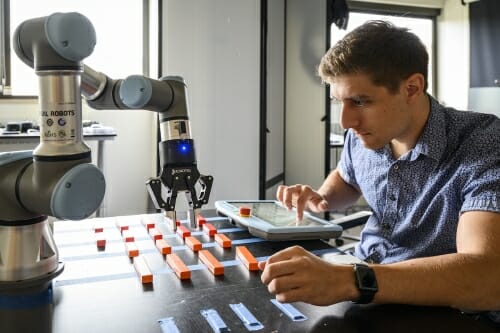The University of Wisconsin–Madison has established a School of Computer, Data & Information Sciences (CDIS) in the College of Letters & Science to strengthen research and education on campus, prepare tech-savvy graduates to fill new kinds of jobs, support a wave of Wisconsin entrepreneurs and partner with industry to provide them with the competitive advantage of the latest technology.
“As technology becomes more pervasive in our world on all levels — from smart devices to algorithms shaping the global flow of information and commerce — it is critical that our university continue to lead in this field,” says UW–Madison Chancellor Rebecca Blank. “The new School of Computer, Data & Information Sciences is a place where top researchers will shape the way the world uses technology, and where Wisconsin’s students can learn how digital-age tools enrich their lives and careers.”


The new school will include the Department of Computer Sciences, the Department of Statistics and the Information School. Tech entrepreneur and UW–Madison graduate Tom Erickson has just arrived as the school’s founding director. Kristin Eschenfelder, Vilas Distinguished Achievement Professor and former director of the iSchool, is CDIS associate director.
The university and UW Foundation will follow the school’s establishment with a major fundraising campaign.
“Our commitment to computing, data and information sciences recognizes their importance to the local and national economy, the extraordinary research opportunities in these fields, and the exploding demand from students for training in these areas,” says Provost Karl Scholz, who was dean of the College of Letters & Science in 2018 when a nine-member “Wisconsin in the Information Age” committee compiled a report recommending the creation of a new school. “Our efforts will open new research and collaborative opportunities and help our students become more literate in the ways of data and information science and how they interact with the subjects they’ve chosen to study.”
CDIS joins the American Family Insurance Data Science Institute, a research center created in the spring and likely to be associated with many CDIS faculty. These are critical components in the university’s strategy to meet Wisconsin’s needs and the interests of faculty and students. Computer Sciences grew in recent years to be UW–Madison’s most popular undergraduate major, with more than 1,560 students in 2018. Last year, nearly 2,700 undergraduate and graduate students were pursuing degrees in majors offered by Computer Sciences, Statistics and the iSchool.
Developing ever-better hardware and software has been the focus of computer scientists and engineers for 50 years, empowering exponential growth in the collection of data and the rise of data science in almost all aspects of society. At the same time, the pervasive assembly and application of big data has created challenges — issues of privacy, ethics, security and more — that the new school will address at the intersections of computing and data with the humanities. A home for CDIS in the College of Letters & Science allows interdisciplinary programs to be developed with disciplines like psychology, journalism and mass communications, biology and physics.

“Every university has had to decide how to respond to the growth in these fields and growing demand from researchers and students excited about the possibilities it presents,” says Eric Wilcots, interim dean of Letters & Science and a professor of astronomy. “The needs of disparate fields like astronomy and history can drive advances in computer, data, and information sciences. Our core principle is that these disciplines are inseparable from the natural and social sciences and humanities.”
“What we’re doing is something unique across the nation, putting these three areas together in a public land grant institution,” Erickson says. “We’re taking three very strong programs and putting them together in a university that also has unmatched breadth and opportunities for collaboration in medicine, engineering, life sciences, nursing, education, and more.”
Erickson, who grew up around the family hardware store in Mondovi, Wisconsin, graduated with a degree in computer engineering from UW–Madison in 1980, and has been part of at least 10 software companies around the world in the last four decades.
His work has taken him from installing software on the first computer system aboard an offshore platform — in the Indian Ocean in the ’80s — to providing products and services for open-source platforms for web content management at Boston-based Acquia.
He helped found Acquia in 2008 and retired from the international firm in 2017 as its CEO. During Erickson’s tenure, Acquia was among the fastest-growing private companies in the country. He sees CDIS helping Wisconsin tap its potential for technology-aided growth by increasing the number of graduates with the skills to fill thousands of tech-heavy jobs and by offering training to the existing workforce.
“We have a desire to really open up to Wisconsin industry, to help their people get up to speed on the evolving way they can use data and computing,” Erickson says. “Strong parts of the state’s economy — agriculture, health care, manufacturing — are learning how advances in artificial intelligence, machine learning, and data collection and analysis can make them more competitive and successful.”
“We have a chance to create a strong ecosystem of innovation, to create jobs and bring significant recognition to Wisconsin as a place where entrepreneurs thrive.”
Tom Erickson
CDIS can help the state add to its traditional strengths with a resurgence in startups in new sectors of the economy.
“With partners in government and industry, we can connect people with new ideas to the support they need to turn those ideas into new companies,” Erickson says. “We have a chance to create a strong ecosystem of innovation, to create jobs and bring significant recognition to Wisconsin as a place where entrepreneurs thrive.”
To Erickson, building a thriving School of Computer, Data & Information Sciences means growing its faculty and boosting the university’s already lofty reputation in computing, statistics and information sciences. It means expanding the way CDIS offers related coursework to other majors on campus — and expanding degree offerings, beginning with proposals for a planned undergraduate program in data science and a master’s in information studies.
“We have thought of literacy for a long time in terms of letters and numbers, but a university education and participation in our society demand a new level of computing and information literacy,” Erickson says. “What we can offer the whole campus are new ways to engage with computing concepts and a revolution in data, to see how they affect privacy, security, the flow of information — many of the challenges that will define their future.”
Chris Barncard |University Communications